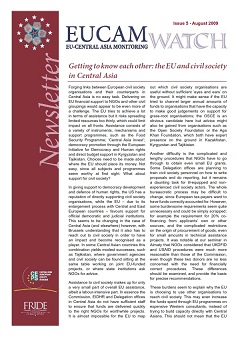Getting to know each other: the EU and civil society in Central Asia
Getting to know each other: the EU and civil society in Central Asia
Author(s): Jos Boonstra, Aigerim Duimagambetova, Bauke Snoep, Adil Nurmakov, Jiří Kopal, Nafisa Hasanova
Contributor(s): Jos Boonstra (Editor), Michael Emerson (Editor), Nafisa Hasanova (Editor), Aigerim Duimagambetova (Editor), Anne Harrington (Editor), Jackie West (Editor)
Subject(s): Civil Society, Government/Political systems, International relations/trade, Security and defense, EU-Approach / EU-Accession / EU-Development, Sociology of Politics, Geopolitics
Published by: CEPS Centre for European Policy Studies
Keywords: European Union; Central Asia; civil society; NGOs; democracy promotion; support for civil societies organisations; security sector reform;
Summary/Abstract: Forging links between European civil society organisations and their counterparts in Central Asia is no easy task. Delivering on EU financial support to NGOs and other civil groupings would appear to be even more of a challenge. The EU tries to achieve a lot in terms of assistance but it risks spreading limited resources too thinly, which could limit impact on all fronts. Assistance consists of a variety of instruments, mechanisms and support programmes, such as the Food Security Programme; ‘Central Asia invest’; democracy promotion through the European Initiative for Democracy and Human rights and direct budget support in Kyrgyzstan and Tajikistan. Choices need to be made about where the EU should place its money. Not easy, since all subjects and programmes seem worthy at first sight. What about support for civil society?
Series: EUCAM Watch
- Page Count: 8
- Publication Year: 2009
- Language: English
- Content File-PDF

